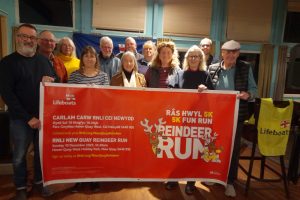
LAST WEEK’s County Council meeting (Mar 10) received a presentation from Marcia Vale, the Dementia Friendly Communities Coordinator from the Alzheimer’s Society.
Ms Vale prefaced her remarks by apologising for her lack of IT skills and lack of facility in the Welsh language.
Her report was well-received and touched upon the Alzheimer’s Society’s campaign calling for the Welsh government to commit to an appropriately resourced National Dementia Strategy, in respect of which it has launched a petition seeking support for its stance from members of the public.
Ms Vale also welcomed the expansion of a pilot scheme for supporting those with dementia in remaining living in their home communities and praised the success of a council-backed pilot scheme in Pontyberem.
In the run up to the 2016 Welsh Assembly elections, Alzheimer’s Society will be campaigning to ensure that all prospective candidates recognize the urgent need for a dementia strategy in Wales.
Responding to the report, Cllr Alun Lenny expressed his disappointment that the presentation was not bilingual, suggesting that it demonstrated a lack of awareness of the role of the Welsh language in the area of dementia.
Cllr Lenny stated: “It is a clinical fact that a number of Welsh speakers lose the ability to speak their second language namely English as this awful disease takes its toll. Imagine being a Welsh speaker who has dementia – advanced dementia – and has staff in a residential home speaking at you in English.
“I am sorry if it is an oversight. If this is an oversight, I hope that it is not a factor in the treatment and advice in all other fields of work by the Alzheimer ‘s Society in Wales.”
Marcia Vale apologised and said: “I am an English speaker. The Alzheimer ‘s Society does not present its policy as being not bilingual. In fact it is due to the Alzheimer ‘s Society’s lobbying of the Welsh Government that we now have the policy that bilingual memory testing services in Welsh will be part of the Health Board’s offer to support people living with dementia.
“It is my lack of skill that it is not side by side translation, not any lack of respect.”
The presentation itself was positively received by members, who took in turns both to praise the work of the Alzheimer’s Society generally and the work being done to assist those with dementia to remain in their home communities and continue to have fulfilling lives within them.
The presentation in part looked forward to the extension of a pilot scheme in Pontyberem to Ammanford, Kidwelly, and Llanelli, a fact spoken on by Cllr Gwyneth Thomas, who praised Parc y Scarlets for coming on board with the aims of the community scheme.
Cllr Sharen Davies (Llwynhendy) expressed surprise at discovering that the Llanelli area was to be part of a dementia friendly community, a fact of which she said she was previously unaware. Cllr John James reminded councillors that the local authority had itself voted to press the Welsh Government to bring forward the sort of concrete strategy the Alzheimer’s Society proposed.
Concluding the discussion, Cllr Jane Tremlett, the Executive Board Member for Social Care & Health, who has worked hard on the Council’s social inclusion policies, called upon councillors to act as leaders in their communities to share what they had heard about the Alzheimer’s Society’s work and to encourage those with dementia to remain engaged in their communities. She assured councillors that a Welsh translation of the presentation would be made available after the meeting.
Cllr Tremlett also made the point, responding to Cllr Lenny, that it was Carmarthenshire’s policy to have a Welsh-speaking member of staff on hand to ensure that those using County Council facilities, who had either lost the ability to communicate in English or preferred to communicate through the medium Welsh were able to do so.
A few days after the meeting, The Herald was contacted by three Labour councillors who expressed their misgivings at what they said was a school masterly approach to the Welsh language issue adopted by Cllr Lenny.
Cllr Sharen Davies told The Herald: “I was appalled at the way she was spoken to like a child in school! Brings back memories! This is no way to encourage individuals to learn or speak Welsh when you have those who criticise! We all understood the presentation and it’s a shame when someone who concentrates more on the language of the presentation than that of the positive delivery services it provides.”
Cllr Alun Lenny responded and told The Herald: “It’s truly sad that a small minority of Labour members just cannot hide their dislike of the Welsh language, judging by their reaction to my comments in the council meeting.
“Not only that, but they failed to understand the connection I was trying to make between language awareness and dementia care and treatment.”
Cllr Lenny explained: “Having care through the medium of Welsh is not just a human rights issue, it’s a clinical necessity. The Dementia Vision for Wales clearly states that if an assessment is carried out in the person’s language of choice, the diagnosis is more likely to be accurate.
“It’s also a clinical fact that as this awful condition progresses, people with dementia may only be able to communicate in their first language. In the case of many people in Carmarthenshire, that language is Welsh.”
Reflecting further, Cllr Lenny continued: “Over the years, I’ve known of Welsh-speaking dementia patients who became isolated and distressed because care staff could only speak English to them. Happily, the (Labour) Welsh Government – which I commended in the Chamber – recognises this in its strategy ‘Much More Than Words’.
“As a consequence, every effort is made by the County Council’s Social Care department to provide services through the medium of Welsh for dementia patients who need such care.”
Alun Lenny concluded: “As one who took part in a long campaign to ensure such service for those suffering from this cruel illness, I feared that the language of the presentation reflected a lack of awareness about language as a clinical factor in dementia. Hence my comments. To my great relief, I’ve since been assured that the Alzheimer’s Society, which does such excellent work, is fully aware of the linguistic dimension.”
The Alzheimer’s Society confirmed that the use of Welsh in the delivery of services to those living with dementia is central to its engagement in Welsh communities.


















Add Comment